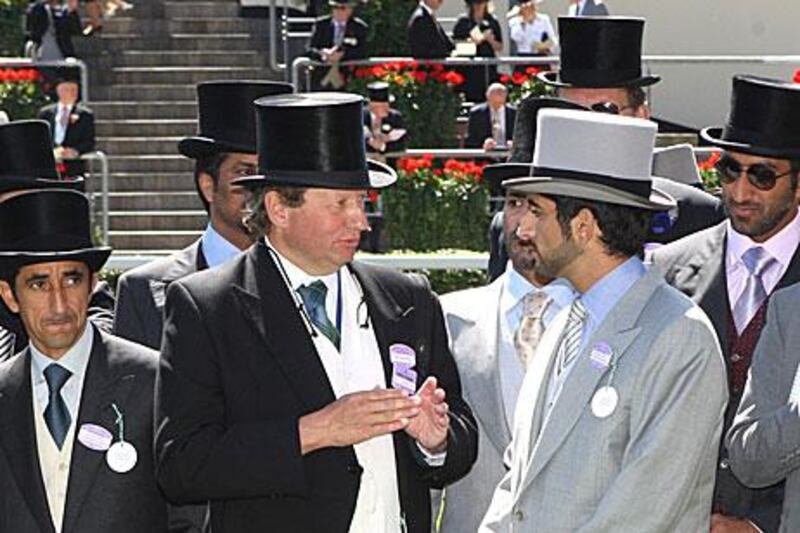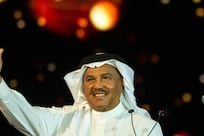The British trainer Mark Johnston tells Geoffrey Riddle why he courts prospective new owners from the world's expanding economies to bolster his own yard
The Emirates Melbourne Cup has always been characterised by European trainers as racing's Everest, but Mark Johnston believes his twin-pronged assault on tomorrow's famous handicap is just the foothills to a much grander project.
The British trainer has flown 10,532 miles to saddle Jukebox Jury and Fox Hunt in the race that is said to bring Australia to a halt. He has joined an increasing band of European trainers who have been inspired by the exploits of Dermot Weld.
Weld, an Irishman, was the first European trainer to lift the Melbourne Cup trophy when Vintage Crop won the Group 1 handicap in 1993. He repeated the trick with Media Puzzle in 2002. After the success of the French horse Americain in front of 110,223 spectators last year there will be a record 11 international raiders among the 24-runner field for Flemington Racecourse's finest 200 seconds.
And yet, despite the 151-year history and lustre of one of the greatest prizes in horse racing, Johnston's bid for victory in Australia is overshadowed by his global ambition.
Throughout 2011 the smart livery of Johnston's grooms has been on display at British racecourses. Ironed white shirts, ties and tartan waistcoats have set them apart. The horses' cover sheets are emblazoned with a burning winged logo below which the words "Always Trying" indicate Johnston's mantra.
With a glossy new brochure straight off the printing press it is an attempt to lure owners from around the world to send their top-class thoroughbreds to Johnston's state-of-the-art yard in the north of England.
"In the current economic climate we in Britain are unlikely to find owners who are going to compete at the top level here," Johnston, 52, told The National. "It is a declining economy, and Asia and the Middle East are expanding economies. I have to look for other owners capable of getting the other half of my string up to the highest level."
Johnston was referring to the section of his stable which does not sport the green and red colours of Sheikh Hamdan bin Mohammed. About half of his prize-money this year in Britain has stemmed from the patronage of Dubai's Crown Prince. Johnston's association with the Maktoum family goes back to 1993 and over the past 18 years he has provided a steady stream of winners for the Dubai royals.
But association with them has had an effect on the rest of his operation, the income of which has veered wildly between yearly prize-money returns of £900,000 (Dh5.3 million) and almost £3m in the past 15 years.
Clearly the operation of any successful business relies on a stable income and although Sheikh Hamdan's horses provide Johnston with winners, the best of those are creamed off to Godolphin. The trainer, therefore, is left with little firepower to compete at the highest level, a situation which he believes must now change.
Although Johnston's reputation is that of a trainer who can improve mid-range horses to run respectably, it is to forget that he has accumulated 21 Group 1 races, including the English 1000 Guineas. Although he regularly duels with Richard Hannon for the accolade of Britain's most numerically successful trainer, this year he lags in eighth in the prize-money list, despite approaching 200 winners. It is a situation that has forced him to look elsewhere, and like the pathfinders of the racing world the Scot has trained his eyes East.
Last month Sheikh Mohammed bin Rashid, Vice President of the UAE and Ruler of Dubai, sent two stallions to stand in China for 2012 to kick-start the bloodstock industry there. The move follows the drive by Dubai's Meydan Racecourse complex to help build a new racing facility there and Johnson has taken note of the direction in which the winds of change are blowing.
"China is hugely exciting, because clearly there is a large number of people there who may well want to operate at the highest level," he said. "We do not have prize money in Britain and there are many things here that are quite poor when compared to the world stage.
"What we do have is wonderful racing, wonderful tracks and a racing heritage that no one else has. Royal Ascot remains the best racing in the world. It may not offer the best day's racing in the world but there is no festival out there that can match it.
"The owners who want to operate on a global scale will want runners there and will want a presence in Britain. I'm their man."
Johnson has developed a business plan for potential investors based on his experiences working with Sheikh Hamdan.
He estimates that to become one of the top five owners in Britain it would require a turnover of £7.5 million per annum. He bases that on a string of around 100 horses, selling the ones that do not make the top grade at the end of each season, buying new ones at the same time and cashing in on the inevitable stallion prospect that is expected from owning such a large amount of horses.
When you consider that subsequent Godolphin flag bearers such as Holberg, Mastery and Shamardal have passed through his hands, it is clear that when he is given the right ammunition he can deliver.
"To have 100 horses with me would cost in the region of £2.5m to train and race," he said. "The total outlay of £5m on new stock seems like a vast sum of money but I believe there are a significant number of people worldwide that are spending that sort of figure on a handful of horses with no possibility of consistently competing.
Sheikh Hamdan's horses are not the first division of Darley animals but, despite this, he is usually in the top five owners."
As an illustration of the possibilities of this process, Sheikh Hamdan's Fox Hunt leads Johnston's attack on the A$6.2m (Dh24.2m) race tomorrow. The four year old started off in handicaps last season, but has progressed to a level that saw him take the German St Leger in September. Although he may not have on paper the same class as Jukebox Jury, who dead-heated with Duncan in the Irish St Leger a week before Fox Hunt's success in Dortmund, the race is likely to be run more to suit.
"Fox Hunt is an ideal candidate," Johnston said. "He is very progressive and at the point where he is making the transition from handicaps to group races. You have not seen the best of him yet and so, hopefully, he is well weighted. His style of running, which often includes a flat spot in the middle, should suit him perfectly.
"Like all top class Europeans heading for Melbourne, Jukebox Jury is weighted accordingly and it will be tough for him. It is also arguable that the Australian, stop-start pace will not suit him and we will be relying on the large number of foreigners changing the typical pace of the race."
The challenge will not be remotely easy. Godolphin also have two horses in the line-up, Lost In The Moment and Modun, as the Dubai-based operation aim to better their record of three seconds and one third from 15 runners. Americain returns to defend his crown while Sheikh Fahad Al Thani's Dunaden is also rated highly.
Nevertheless, Johnston is bullish about his chances and welcomes the rare opportunity to showcase his talents outside of Europe.
Follow
The National Sport
on
[ @SprtNationalUAE ]
& Geoffrey Riddle on
[ @louchepunter ]
Godolphin's near misses at the Melbourne Cup
Godolphin have run 15 horses in the Melbourne Cup, with three seconds and one third. The first winner in Australia for the Dubai-based operation was Hatha Anna in the Group 2 Queen Elizabeth Stakes in 2001 at Flemington Racecourse.
Central Park, 2nd: 1999
Barely anyone gave the four year old a chance but Frankie Dettori, above, had other ideas and led the field early. Dettori was still hanging on with 300 metres to go but a thrilling battle ensued with Rogan Josh, who enjoyed a 7.5kg advantage, and Central Park was headed only 25 metres from the line.
Give The Slip, 2nd 2001
Richard Hills suffered the same fate as Dettori after Ethereal, the New Zealand mare, reeled in the Godolphin challenger in the final 40 metres. Hills was clear by four lengths with 400m to go, but stuck to the far rail to aid his tiring mount. He received a barrage of criticism from the Australian media, who called it a “dopey” ride for missing the better ground down the centre of the track.
Crime Scene, 2nd 2009
Crime Scene had finished second at Nad Al Sheba to Eastern Anthem, the subsequent Dubai Duty Free winner, so had the talent. Kerrin McEvoy, the jockey, angled out the six year old for a run 400m from home. Eventual winner Shocking, who was bred by Darley’s Street Cry, made a similar move at a similar time, however, and outstayed Crime Scene to the line.





